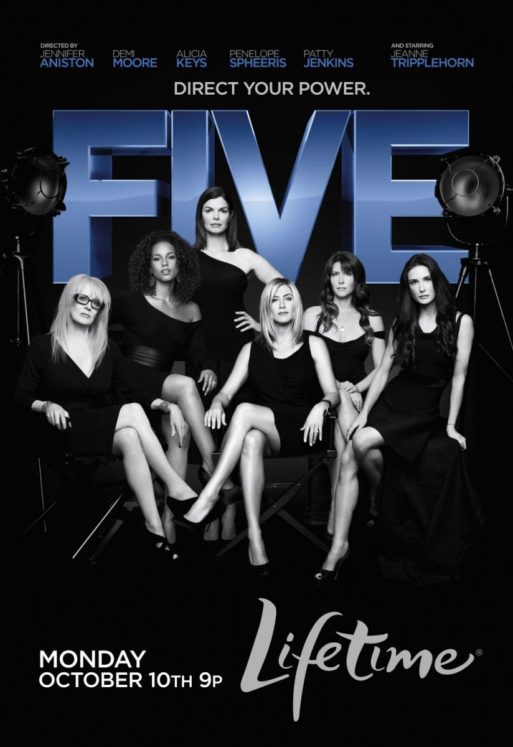 Last night marked the premiere of Lifetime’s made-for-TV film “Five,” which showcased the directing talents of five famous women: actresses Demi Moore and Jennifer Aniston, singer Alicia Keys, and directors Penelope Spheeris and Patty Jenkins. Each of the five mini-films comprising “Five” spotlighted a different female character, struggling with breast cancer in their own way. While I had my doubts (it was a Lifetime made-for-TV film, after all), the film had heart and humor and only occasionally veered into weepiness. The directing was impressive, particularly the work by Moore and Aniston, and the casts, full of recognizable names and faces, were exceptionally strong.
Last night marked the premiere of Lifetime’s made-for-TV film “Five,” which showcased the directing talents of five famous women: actresses Demi Moore and Jennifer Aniston, singer Alicia Keys, and directors Penelope Spheeris and Patty Jenkins. Each of the five mini-films comprising “Five” spotlighted a different female character, struggling with breast cancer in their own way. While I had my doubts (it was a Lifetime made-for-TV film, after all), the film had heart and humor and only occasionally veered into weepiness. The directing was impressive, particularly the work by Moore and Aniston, and the casts, full of recognizable names and faces, were exceptionally strong.
“Five” begins with the short film “Charlotte,” directed by Demi Moore. This impressionistic piece is told almost entirely through the eyes of a child, struggling to understand what is happening to her cancer-stricken mother (Charlotte, played by Ginnifer Goodwin). Set against the backdrop of the 1969 moon landing, Pearl wanders around a house filled with relatives who refuse to tell her what is wrong. Instead they try to distract her, trying to keep her from seeing her mother. She grows increasingly frustrated; she demands of her father, “Why is everyone telling me I’m pretty?” When her grandmother (Annie Potts) finally relents and allows her into her mother’s room, they share a heartbreaking exchange. It is an interesting perspective on the ways adults attempt, often in vain, to shield the reality of death from young children.

Pearl (Jeanne Tripplehorn) kisses the wall after beating breast cancer
Jennifer Aniston’s short film “Mia” provides a mixture of humor and drama, as it tells the story of Mia’s (Patricia Clarkson) fight against cancer in a series of flashbacks. The first scene shows us her fight has a happy ending: she is marrying Mitch (Tony Shalhoub) in a beautiful outdoor ceremony. Yet at one point her cancer looked unbeatable, and in one hilarious flashback she throws her own “funeral” and proceeds to tell everyone present what she really thinks about them (with particularly scathing commentary for those who weren’t there for her when her cancer hit).
The other three films have their moments as well. Alicia Keys’ “Lili” shows us never to underestimate the importance of a support system; Penelope Spheeris’s “Cheyanne” traces the tragedy of a young woman who must lose both her breasts; Patty Jenkins’ “Pearl” wraps up the series with a look at how the daughter of a breast cancer victim faces her own illness later on.
While “Five” had its “Lifetime made-for-TV film” moments (a few instances of saccharine dialogue; the film “Cheyanne” centering on the movie-land premise of a stripper and her beats-up-guys-who-owe-money thug husband), it was overall an affecting series of stories that kept its touch light, relatable, and sweet. It will probably have the added bonus of influencing more than a few women to stay proactive about early detection.

 “Five” by Lifetime TV
“Five” by Lifetime TV



 The Other Death in the Family
The Other Death in the Family















